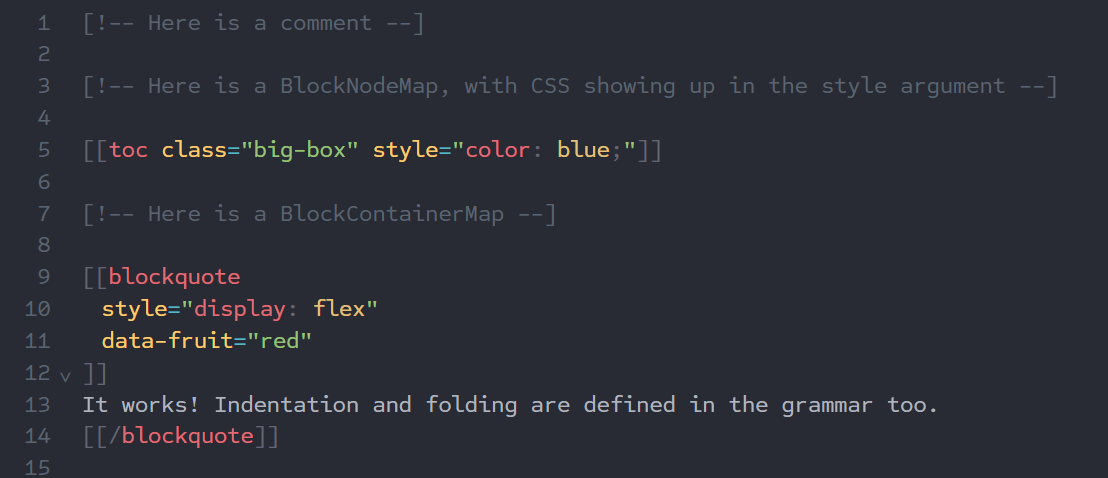An alternative parser for CodeMirror 6. Its grammar focuses on being extremely flexible while not suffering the consequence of being utterly impossible to understand. It's inspired a bit by the Monarch and Textmate grammar formats, but pretty much entirely avoids the pitfalls of their systems.
Tarnation is not line-based. It is capable of reusing both previous and ahead data when parsing, making it fully incremental. It can restart from nearly any point in a document, and usually only barely parses the immediate region around an edit. It also doesn't use very much memory, due to some clever usage of ArrayBuffer based tokens.
Tarnation was created as part of my work on Wikijump.
Tarnation can do things that Lezer (the parser you'd usually use for CodeMirror) can't. For example, Tarnation can parse something like Markdown, and other weird esoteric markup/formatting languages.
However, if you're not trying to make a grammar for some bonkers language, it's probably possible to make a grammar using Lezer. You should almost certainly do this - its grammar format is probably superior to Tarnation's, and it will be faster and better behaved in general.
npm install cm-tarnation
Tarnation's grammar is basically a JSON matching a certain schema. It's designed more around YAML, though.
TODO
For now, an example of a highly complex grammar using all available features of Tarnation can be found here, in the ftml.ts and ftml.yaml files. This grammar is used to parse wikitext for the Wikijump project, in the Sheaf editor.
This is a simplified form of the grammar linked above:
comments:
block:
open: "[!--"
close: "--]"
ignoreCase: true
repository:
ws: /[^\S\r\n]/
namela: /_?(?:@ws|@BlockEnd|$)/
BlockComment:
match: /(\[!--)([^]+?)(--\])/
tag: (...) blockComment
fold: offset(3, -3)
captures:
0: { open: BlockComment }
2: { close: BlockComment }
BlockStart:
match: /\[{2}(?![\[/])/
tag: squareBracket
closedBy: BlockEnd
BlockStartClosing:
match: /\[{2}//
tag: squareBracket
closedBy: BlockEnd
BlockEnd:
match: /(?!\]{3})\]{2}/
tag: squareBracket
openedBy: [BlockStart, BlockStartClosing]
BlockNamePrefix:
match: /[*=><](?![*=><])|f>|f</
tag: modifier
BlockNameSuffix:
match: "_"
lookbehind: '!/\s/'
tag: modifier
BlockLabel:
match: /[^\s\]]+/
tag: invalid
BlockNodeArgument:
match: /(\S+?)(\s*=\s*)(")((?:[^"]|\\")*)(")/
captures:
0: { type: BlockNodeArgumentName, tag: special(propertyName) }
1: { type: BlockNodeArgumentOperator, tag: definitionOperator }
2: { open: BlockNodeArgumentMark, tag: string }
3:
if: $0
matches: style
then: { type: CSSAttributes, nest: style-attribute }
else: { type: BlockNodeArgumentValue, tag: string }
4: { close: BlockNodeArgumentMark, tag: string }
BlockNameMap:
lookup: $var:blk_map # external variable
lookahead: /@namela/
emit: BlockName
tag: tagName
BlockNameMapElements:
# lookup is a list of strings that can be matched
lookup: $var:blk_map_el # external variable
lookahead: /@namela/
emit: BlockName
tag: tagName
# blocks
BlockNodeMap:
emit: BlockNode
indent: delimited(]])
skip: /\s+/
chain:
- BlockStart
- BlockNamePrefix?
- BlockNameMap
- BlockNameSuffix?
- BlockNodeArgument |* BlockLabel
- BlockEnd
BlockContainerMap:
emit: BlockContainer
fold: inside
begin:
type: BlockContainerMapStartNode
emit: BlockNode
indent: delimited(]])
skip: /\s+/
chain:
- BlockStart
- BlockNamePrefix?
- BlockNameMapElements
- BlockNameSuffix?
- BlockNodeArgument |* BlockLabel
- BlockEnd
end:
type: BlockContainerMapEndNode
emit: BlockNode
indent: delimited(]])
skip: /\s+/
chain:
- BlockStartClosing
- BlockNamePrefix?
- BlockNameMapElements
- BlockNameSuffix?
- BlockEnd
includes:
blocks:
- BlockNodeMap
- BlockContainerMap
global:
- BlockComment
root:
- include: blocksThis grammar can yield syntax highlighting that looks like this:

Tarnation is welcome to PRs, issues, etc. If you want to understand how Tarnation works, I made sure to spend a lot of time nicely documenting the source files. It's not all that complicated really. It would help you a lot if you read up on how CodeMirror itself works, though.
Tarnation is built using TypeScript, with no special build tools. You can use the following command:
npm run build
MPL 2.0. See the license file for more details.